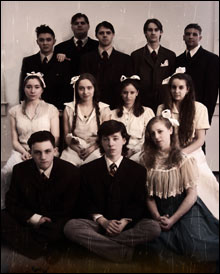
YOUTHFUL ANGST Mad Horse’s Spring Awakening cast. |
Images of white plum blossoms surge over both the back wall and the floor of the Spring Awakening set. The stage has been painted in the style of Japanese ink-and-watercolor, the white of the flowers dazzling against dark boughs and the grayscale turmoil of clouds. This white, we know, is brief, but in its moment it is so intense as to be almost unnerving. Figuratively, this is the psychic setting of a drama about that most fraught, fertile, and ultimately fleeting moment of life, adolescence. First written in 1891, Frank Wedekind's Spring Awakening opened in Germany in 1906, was banned after a single performance, over a hundred years later became a Broadway musical hit, and has now been re-translated from the original German by wunder-novelist Jonathan Franzen. Here I preview Mad Horse's haunting, highly recommended production of this dark script, directed by Christine Marshall and performed by a simply exceptional cast of young local actors.All the young characters of Spring Awakening are dealing with the vicissitudes of adolescence — nascent sexuality; social, familial, and educational pressures; and questioning of the larger world — but do so in a range of sensibilities: 14-year-old Wendla (the luminous Grania Power, as if channeling wild and primal elements) wakes to the unknown with a wide-open, startling exuberance. Ferocious cynic Melchior (Nate Speckman, who smolders) claims not to believe in god, love, or selflessness. For the raw-nerved Moritz (Dylan Chestnut, with preternatural, trembling anxiety), distress over his studies is second only to distress over his ignorance of sex, and what to make of his own powerful new stirrings.
It is from their own vantage that we see these young people; their world is one where adults are rendered as absurd grotesques, with blackened eyes, Dickensian names (Headmaster Hart-Payne, Professor Starver), and amplified stutters and tics. The grown-ups in their realm are all either foolish, sadistic, or tragically inadequate, and the teenagers' separateness from their elders amplifies their experiences: Sensation is often measured not by pleasure but intensity, the unknown at once horrifies and arouses, and eros is often inextricable from violence, guilt, and struggles with power. When Wendla, for example, learns that Martha (Kelsey Krull) is regularly beaten at home, her desire to know what her friend feels — strong enough that she later asks Melchior to beat her with a stick — mingles her natural empathy with her curiosity about a whole array of heretofore unknown sensations, whose existence she is just beginning to sense.
The 11 young actors of this cast show an extraordinary sensitivity to the language, drive, and ambiguities of a 19th-century script of strikingly modern sensibilities. Marshall has also done excellent work in directing the overall gestalt of the boys (a cacophony of personalities who begin scenes in gorgeous, painterly tableaux against the set) vis-à-vis the girls (in frequent rushes of laughter, constantly caressing each other).
There seems indeed to be a fundamental difference between the boys and the girls: Wendla and Ilse, an older, promiscuous artist's model (Kat Moranos, with enticing dynamism), exalt in and are aroused by chaos, the potentially violent unknown, and the prospect of submission to it, though they are disadvantaged by the dominant culture and biology. Melchior and Moritz, while of the dominant sex, are often hamstrung and desperate, left fantasizing wistfully about the bliss of the female orgasm.